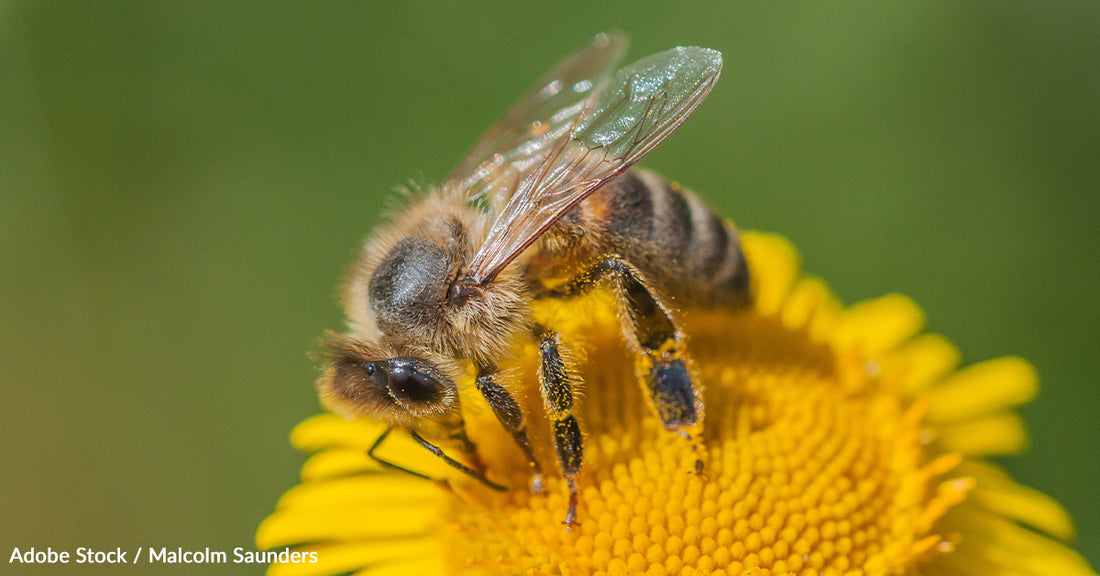A New Honeybee Vaccine Could Save Pollinators From Disease, But They Still Need Our Help
Matthew Russell
Honeybees are an integral part of our natural world, serving as pollinators for a wide range of plants and crops. Without honeybees, our food supply would be severely impacted, as approximately one-third of the food we consume relies on pollination from bees.
However, honeybees in the United States are facing a number of challenges that threaten their survival.
One major threat to honeybees is the use of pesticides, which can poison bees and disrupt their ability to pollinate, the EPA reports. In addition, honeybees are also facing challenges from parasites and diseases, such as the varroa mite and American foulbrood. These pests and diseases can decimate entire colonies, leading to a decline in the overall population of honeybees.
 Photo: Adobe Stock / Malcolm Saunders
Photo: Adobe Stock / Malcolm SaundersPesticides, parasites, and diseases are major threats to honeybees.
However, there is new hope for our pollinators in the form of the first-ever vaccine for honeybees, developed by U.S. biotech firm Dalan Animal Health, Axios reports. This vaccine, called "Apistan," has been shown to be effective in protecting honeybees against the varroa mite, a major cause of hive loss, as well as stop the spread of American foulbrood disease, caused by Paenibacillus larvae bacterium, which can weaken and destroy hives, according to The Guardian.
 Photo: Adobe Stock / Darios
Photo: Adobe Stock / DariosThe USDA's first-ever vaccine for honeybees could help protect against hive loss.
The U.S. Department of Agriculture (USDA) has granted a conditional license for Apistan, which is incorporated into the royal jelly by the worker bees, who then feed it to the queen, Dalan maintains.
"She ingests it, and fragments of the vaccine are deposited in her ovaries. Having been exposed to the vaccine, the developing larvae have immunity as they hatch," reads Dalan's official press release.
Scientific studies showed vaccinated queens were more resistant to infection and it provided immune protection for their offspring. However, while the development of the Apistan vaccine is a significant step forward, it is important to note that it is not a silver bullet solution, NPR reports.
Honeybees still face a number of challenges, and it will take a multifaceted approach to ensure their long-term survival. This may include efforts to reduce the use of pesticides, promote sustainable beekeeping practices, and protect habitat for bees.
 Photo: Adobe Stock / Olga D. van de Veer
Photo: Adobe Stock / Olga D. van de VeerReducing the use of pesticides and promoting sustainable beekeeping practices can help honeybees thrive.
Overall, the plight of honeybees in the United States is a complex issue, but with the development of the Apistan vaccine and other efforts to support these important insects, there is hope for a brighter future.
It is important to remember that honeybees are just one part of the larger ecosystem, and the health of other pollinators, such as butterflies and hummingbirds, is also essential, the Natural Reserve System reports. These important insects are facing a number of challenges that threaten their survival, including the use of pesticides, habitat loss, and parasites and diseases.
 Photo: Adobe Stock / Elenathewise
Photo: Adobe Stock / ElenathewisePlanting a pollinator-friendly garden can provide a haven for honeybees and other insects.
If we don't take action, we risk losing these vital pollinators forever. Here are a few steps that anyone can take to help save honeybees:
5. Reduce the use of pesticides
Pesticides can be harmful to honeybees and other pollinators, so consider using alternative methods for pest control in your garden or on your property.
 Photo: Adobe Stock / Светлана Лазаренко
Photo: Adobe Stock / Светлана ЛазаренкоGet involved in advocacy efforts to help protect honeybees and other pollinators.
4. Plant a pollinator-friendly garden
By choosing plants that provide nectar and pollen for pollinators, you can create a haven for bees and other insects. Native plants are often the best choice, as they are adapted to the local climate and provide resources for a wide range of pollinators.
 Photo: Adobe Stock / Thanaphum
Photo: Adobe Stock / ThanaphumEvery action counts in the fight to save honeybees and other essential pollinators.
3. Support sustainable beekeeping practices
If you are interested in keeping bees, consider supporting beekeepers who use sustainable practices, such as natural hive management and treatment of bees with non-toxic methods.
 Adobe Stock / StockedandLoaded
Adobe Stock / StockedandLoadedBy working together, we can create a brighter future for honeybees and the many plants and crops that rely on them.
2. Educate yourself and others
The more we understand about the challenges facing honeybees and other pollinators, the better equipped we will be to take action to help them. Consider learning more about these issues and sharing what you learn with others.
1. Get involved in advocacy efforts
There are many organizations that are working to protect honeybees and other pollinators, including Greater Good Charities and Project Peril and you can support their efforts by advocating for change at the local, state, and national level. Project Peril, a signature program of Greater Good Charities, is helping beekeepers on the ground provide supplemental feed of sugar and pollen where honeybees live. Project Peril is committed to saving ALL bee populations working with the best non-profits to help plant bee-friendly forage and raise awareness on the importance of bees.
 Adobe Stock / Africa Studio
Adobe Stock / Africa StudioTake the pledge to save our honeybees!
By taking these simple steps, we can all make a difference in the fight to save honeybees and other critical pollinators from disappearing forever. You can take it one step further and pledge to become a Pollinator Protector!
Click below to make a difference.

 Photo:
Photo:  Photo:
Photo:  Photo:
Photo: 